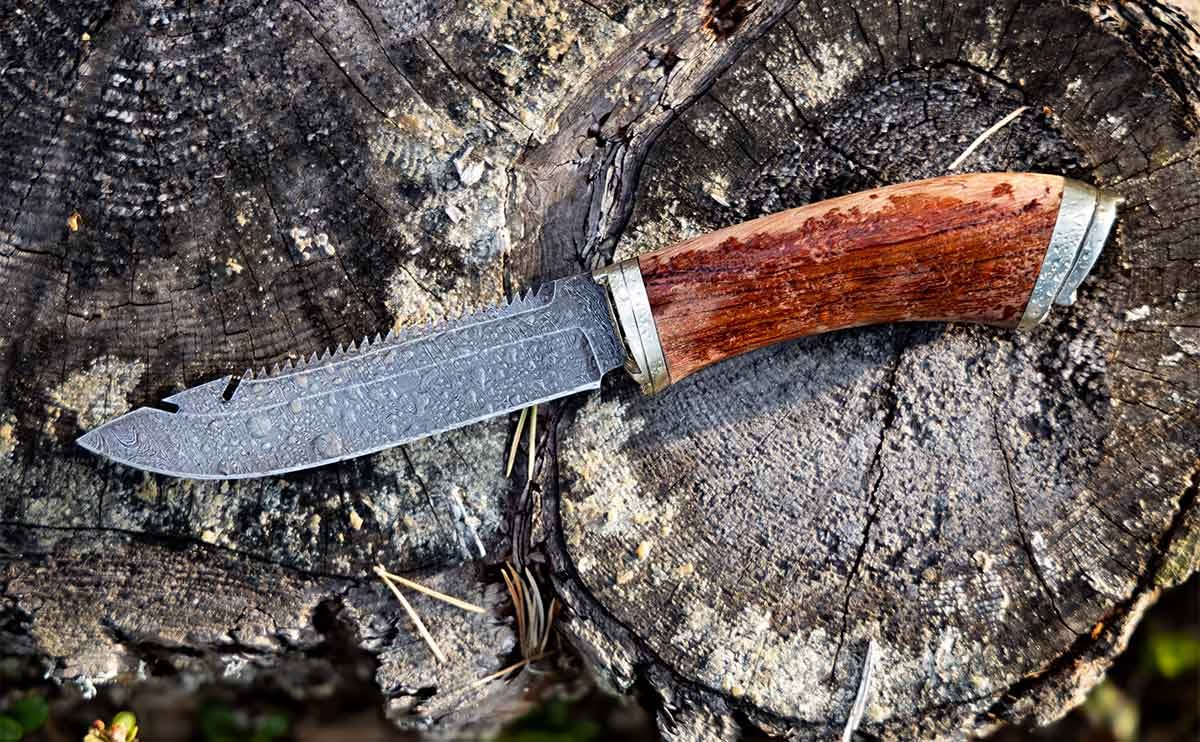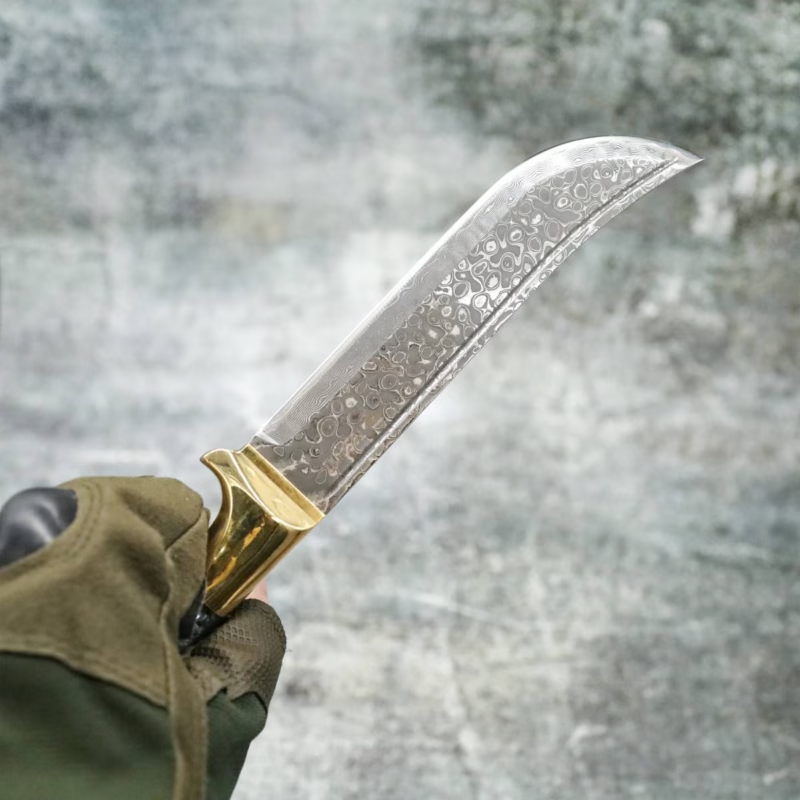How To Care For Damascus Steel Knife?A Comprehensive Expert Guide

Table of Contents
Introduction: Why Proper Care Matters for Your Damascus Steel Knife
Damascus steel knives are renowned not only for their striking, wavy patterns but also for their strength and sharpness. These unique knives often become prized possessions due to their visual appeal and superior functionality. However, the qualities that make Damascus steel so desirable also demand careful attention to preserve its beauty and performance over time. This guide provides essential tips on how to maintain your Damascus steel knife to ensure it stays in optimal condition for years to come.
Understanding Damascus Steel: Why It Requires Special Care
The beautiful patterns on Damascus steel blades are more than just decorative—they come from a complex forging process that combines different types of steel, resulting in a layered structure. Modern Damascus steel often combines stainless steel with high-carbon steel. The contrast in steel types leads to the eye-catching patterns after the acid etching process. This process, which involves selectively corroding different steel layers, highlights the contrast between the metals, but also makes the knife more prone to oxidation, particularly on the high-carbon steel layers.
High-carbon steel, which is a key component in many Damascus blades, is more susceptible to rust compared to stainless steel. The reaction of the iron in high-carbon steel with oxygen and moisture leads to rust, which can damage both the blade and its appearance. Even knives made with stainless steel in their Damascus layers require regular care to preserve their appearance and prevent corrosion. Given the unique composition and acid-etched surface, Damascus steel knives require a thoughtful approach to cleaning and maintenance.

Essential Steps for Proper Damascus Steel Knife Care
To maintain your Damascus steel knife’s beauty and functionality, daily and regular care is essential. The following steps will help you preserve both the performance and the stunning aesthetic of your knife.
Immediate Cleaning After Use
Cleaning your knife immediately after each use is crucial to avoid long-term damage. Acidic foods like citrus and steak can accelerate corrosion if not cleaned promptly. Here’s how to clean your Damascus steel knife properly:
- Rinse with Warm Water: After use, rinse the knife under warm water to remove loose food particles.
- Use Mild Soap and a Soft Sponge: For a thorough clean, use mild dish soap and a soft cloth or sponge. Avoid abrasive materials like scouring pads or steel wool, which can scratch the delicate Damascus pattern.
- Avoid Harsh Chemicals: Never use harsh detergents or chemicals, especially those containing chlorine. These can damage the blade’s finish and harm the etched pattern.
Important Tip: Never put your Damascus steel knife in the dishwasher. The combination of high temperatures, harsh detergents, and prolonged moisture exposure can cause significant damage, including rust formation and pattern degradation.
Thorough Drying
Moisture is the primary enemy of Damascus steel, particularly high-carbon steel. After washing, always dry the knife thoroughly with a soft, clean cloth. Ensure the blade is fully dry, paying attention to areas around the handle, as hidden moisture can lead to rust. To be extra cautious, let the knife air dry for a few more minutes.
Oiling and Lubrication
A thin layer of oil provides a protective barrier against moisture, helping to prevent rust. Here’s how to oil your knife:
- Use Food-Grade Mineral Oil or Knife-Specific Oil: Food-grade mineral oil is a safe and non-reactive option, though other oils like coconut oil or paraffin oil can also work well. Avoid oils like olive oil, which can go rancid and leave a sticky residue.
- Apply a Thin Layer: Use a soft cloth to evenly coat the blade with a thin layer of oil. This will create a moisture-resistant barrier, keeping the knife protected.
Oil your knife regularly—especially after cleaning. If it’s used frequently, consider oiling it after each use. For knives stored long-term, oiling once a week or before storage is ideal.
Safe and Effective Storage
Proper storage plays a critical role in protecting your Damascus steel knife from rust and other damage. Store your knife in a dry, consistent environment to prevent moisture exposure.
- Avoid Leather Sheaths for Long-Term Storage: Leather can trap moisture, which can promote rust. If you must use leather temporarily, ensure the knife is well-oiled and wrapped in cling wrap.
- Use Knife Blocks or Magnetic Strips: Knife blocks and magnetic strips are excellent choices for storing your Damascus knife. Just make sure the blades do not come into direct contact with each other to prevent scratching.
Important Tip: Avoid using dehumidifier bars in storage spaces with natural handle materials (like wood or stag), as low humidity can cause cracking.
Maintaining the Edge: Sharpening Your Damascus Steel Knife
While Damascus steel holds a sharp edge, it may need sharpening more frequently than stainless steel knives. Regular sharpening not only ensures a sharp blade but also contributes to safety by reducing the force required to cut.
Recommended Sharpening Tools:
- Whetstones: Whetstones, particularly those with a finer grit (1000 grit or higher), are ideal for sharpening Damascus steel knives. Soak the stone before use and maintain the proper sharpening angle, typically between 15 and 20 degrees.
- Honing Steel: Honing steel helps realign the microscopic teeth of the blade’s edge between sharpenings. It is a useful tool to maintain sharpness, but it won’t remove material like a whetstone.
Avoid Electric Sharpeners: Powered electric sharpeners are not recommended for Damascus steel, as they can damage the blade’s delicate structure. It’s best to learn proper sharpening techniques with a manual tool.
Preventing Rust and Corrosion
High-carbon steel is prone to rust, making proactive care essential. The key steps for preventing rust are:
- Clean and Dry the Knife After Use: Always clean and dry your knife immediately after use.
- Regular Oil Application: Apply oil regularly to create a protective barrier against moisture.
- Proper Storage: Keep your knife in a dry place, away from leather or humid environments.
If rust does appear, act quickly to remove it using safe methods like using a paste of baking soda and water or soaking the affected area in white vinegar for short periods.
Preserving the Damascus Pattern
The Damascus steel pattern is a prized aesthetic feature that can fade or become damaged if not properly cared for. To preserve the pattern:
- Avoid Abrasive Materials: Don’t use rough cloths, steel wool, or metal polishes, as these can strip the contrast between the layers.
- Handle Acidic Foods with Care: Prolonged exposure to acidic foods can gradually affect the etching.
In cases where the pattern fades significantly, re-etching the blade can help restore its definition, but it’s a process that can only be done a few times.
Common Mistakes to Avoid
To maintain your Damascus steel knife, avoid these common mistakes:
- Using abrasive materials for cleaning.
- Storing the knife in a damp environment or in leather for long periods.
- Letting the blade stay wet after use.
- Using harsh chemicals or bleach.
- Cutting on hard surfaces like glass or metal.
- Using rancid oils like olive oil.
Environmental Factors: Humidity and Temperature
Moisture and temperature fluctuations can significantly affect the condition of your Damascus steel knife. In humid climates, extra care is needed to clean, dry, and oil the knife regularly. Keep the knife in a consistent, dry environment to minimize the risk of rust and corrosion.
Conclusion: Ensuring Longevity and Beauty
By following these expert care guidelines, your Damascus steel knife will remain a functional and beautiful tool for years to come. Regular cleaning, drying, oiling, proper storage, and sharpening are essential to preserving the knife’s sharpness, durability, and the stunning Damascus pattern. With the right care, your Damascus steel knife will continue to be a treasured, reliable kitchen companion.




